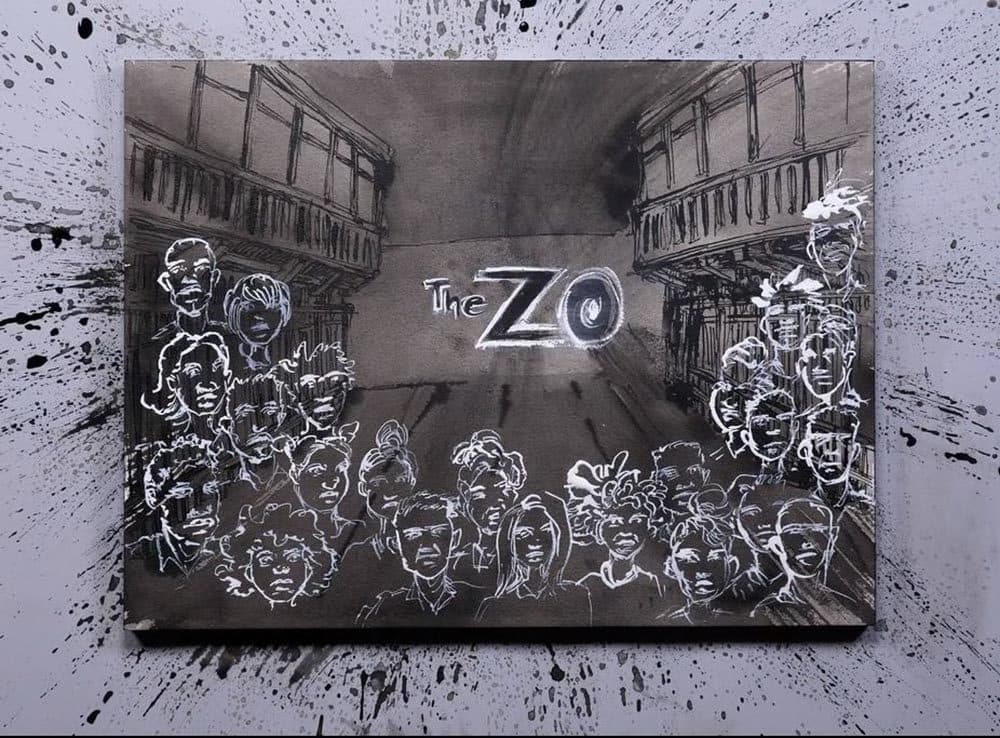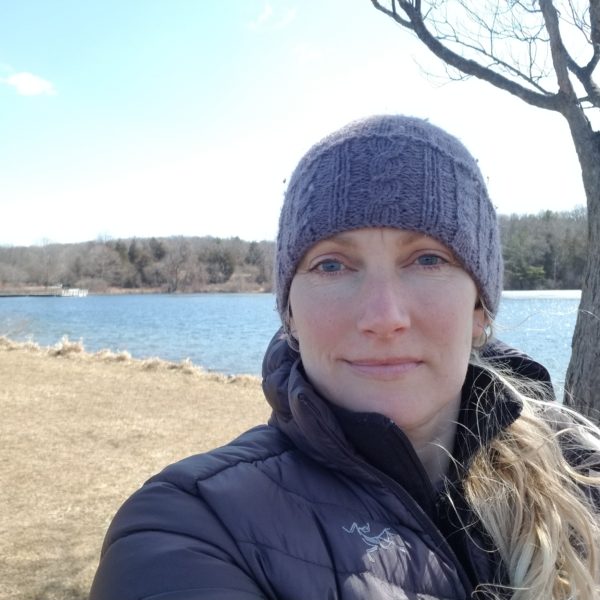Advertisement
With 'The Zo,' A Look At Life Inside Prison

A new series of videos from The Marshall Project takes a look at life inside prison, through the words of prisoners themselves.
Guests
Patrick Doolittle, His college senior thesis was the basis for "The Zo." The thesis was titled: “The Zo”: Disorientation and Retaliatory Disorientation in American Prisons.
Lawrence Bartley, director of "News Inside" for The Marshall Project. (@lawbartley)
Doran Larson, professor of literature and creative writing at Hamilton College. He teaches college courses on prison writing, and since November 2006 has taught a creative writing class inside a maximum-security state prison. (@HamiltonCollege)
Molly Crabapple, artist and writer. She produced and illustrated the animated videos for "The Zo." (@mollycrabapple)
"The Zo" three-part series
Interview Highlights
On first-person essays Patrick Doolittle found in the American Prison Writing Archive that provided the source material for 'The Zo'
Patrick Doolittle: “I just started reading, really. So I read hundreds of them. And what I found was just this incredible uniformity across these essays when it came to actually how these inmate authors were characterizing the experience of being in prison. So, many of them describe that experience the exact same way, which is as being in this kind of prolonged state of total disorientation. That's what stuck out: this idea of a kind of disorientedness, rather than aggression or frustration, anger or even just lack of freedom.
"The primary quality they identified was confusion, disorientation, just having no sense of what's true and what isn't. And that's, of course, you know, where the essay and the videos get their name – ‘The Zo’ — short for The Twilight Zone. … This kind of suspended, surreal state, which makes them feel totally helpless. You know, like they have no agency at all. And that's just it, right? When you dig a little deeper, you find that, you know, it's not just the result of their confinement, this disorientation.
"It's not just a symptom or a byproduct of it. It's really instilled and imposed deliberately by prison administrators and bureaucracies. Like it is the machine. It's not a bug in the machine. That's what sort of really shocked me. That these administrators have discovered that basically the most helpless subordinate state is the state of uncertainty and confusion. And that there are calculated kind of ways they can impose that state as a means of subordinating inmates and thereby, you know, making them more manageable.”
Advertisement
"Many of them describe that experience the exact same way, which is as being in this kind of prolonged state of total disorientation."
Patrick Doolittle
On what people can learn from watching ‘The Zo’
Patrick Doolittle: “I think a big part of it is that, you know, this disorientation, this kind of adrift unsettled state, the nonsensical ... rules that set it in, that impose it, that instill it, they're a huge part of why our justice system doesn't rehabilitate people who go to prison. You can't rehabilitate inmates who feel this kind of instilled, imposed, deliberately-calculated kind of adrift state, you know, as a means of subordination. They're not open to the lessons of any of the engagement, classes, any of these kinds of things that are offered by the prison. You know, in the name of rehabilitation, which, of course, are really these kind of just Potemkin setups to have the cover of rehabilitation while what's really going on is simply oppression and confinement.”
On the importance of ‘The Zo’
Lawrence Bartley: “It gives voice and reality to some of the things that go on inside of a prison that people have been clamoring about for a very long time. I always say that incarcerated people are like an invisible population, even though there's about 2.3 million of them, because largely they believe that no one cares what they have to say. And while incarcerated, they're like the lowest of the lowest of class of a citizen.
"And it's very easy for people incarcerated to develop feelings of despair and sometimes even believe it. ... And I went through that myself for many, many years. I was unfortunately incarcerated at the age of 17. And I did 27 years and two months. And even I'd been out for nearly two years, and that zoom-by occurs about 5:30 a.m. And at 5:30 a.m., I'm up every day still. It's just something ingrained in me that makes sure that I'm up at that time. So it has these long-term, lasting effects.
"And I like for not only incarcerated people to know that their stories and their woes are being told. I would like guards to hear this. Prison administrators to hear this. Because there are these little, subtle rules or practices that go on that create this psychological imbalance and it doesn't have to be. There's different countries like Norway that operate their prison systems in a different way, a more progressive way. And all these little nuances that are illustrated in 'The Zo' don't happen.”
"I always say that incarcerated people are like an invisible population, even though there's about 2.3 million of them, because largely they believe that no one cares what they have to say."
Lawrence Bartley
On what can be learned from the American Prison Writing Archive and 'The Zo'
Doran Larson: “If you're talking about a sort of, you know, 30,000-foot view, that in the U.S. we have remarkable tolerance for poverty, and domestic violence and the breakdown of communities. But we have very little tolerance for the despair that people fall into and the way they respond to that despair coming out of those communities and those sorts of issues.
"I'm also struck by the, how would I say, sort of desperate generosity of writers from inside. These are folks who are really quite desperate to establish their full humanity because they fully understand how little of that is allotted to them, credited to them, by the public. They want to establish the fact that they are fully human beings no matter what they've done. And despite the circumstances, or, rather, the conditions they're subjected to. And also quite generous in the sense that it's very few writers who write exclusively about their own conditions or their own experience.
"They see their own experience as a representative of the experience of literally tens of thousands — millions of other people. And it's clear that they have the impulse not just to get their own stories out, but to get those stories out so that we understand more about the system itself and the suffering that's being undergone by so many other people around them.”
From The Reading List
The Marshall Project: "'The Zo' Where Prision Guards' Favorite Tactic Is Messing With Your Head" — "Back in May 2017, Vesla Weaver, a political scientist then teaching at Yale (now at Johns Hopkins) sent me a student project she thought deserved a wider audience. The thesis by senior Patrick Doolittle was called ‘The Zo: Disorientation and Retaliatory Disorientation in American Prisons.'
“'If I could give this essay an A+, I would,' she wrote. 'Doolittle's essay is the most original, analytically complex, and most powerful essay I have advised over the years; I literally could not put it down.'
“'The Zo,' prison jargon for The Twilight Zone, was based on a huge archive of letters compiled by the American Prison Writing Archive, a remarkable open-source database invented by Doran Larson, a professor of creative writing at Hamilton College. It is a disturbing study of a struggle between prisoners and their captors, waged not with fists or weapons but with deliberately disorienting rules and impossible tasks. Guards mess with the prisoner’s heads. Those incarcerated try to keep their grip on reality by clinging to details—days until parole, prices of items in the commissary, the minutiae of routine. Guards escalate, inflicting arbitrary transfers or random stints in isolation."
Los Angeles Review Of Books: "The Voices from Inside: On 'Prison Truth'" — "In 2017, Oprah Winfrey visited Pelican Bay State Prison in California for 60 Minutes and openly empathized with an inmate’s predicament. It was a departure from the standard primetime interviews with an inmate in which the journalist extracts lurid details about crimes. (Dr. Phil once asked a man convicted of murdering his mother with a sledgehammer what it sounded like.)
"As celebrated journalist and UC Berkeley professor William Drummond notes in his new book, Prison Truth, Oprah’s empathetic interview was another milestone in the media’s portrayal of prisons. It represented a shift away from the violence and brutality of the tough-on-crime era and toward the prison reform narrative of our present day.
"Drummond’s book is about the recent rebirth of the San Quentin News, a newspaper written, edited, and published by inmates at San Quentin prison. This newspaper delivered something the world has for too long suppressed: humanizing stories of prisoners, told by prisoners. 'Inside the dingy confines of the newsroom at San Quentin,' Drummond writes, 'a dozen or so convict journalists played a significant role in changing the narrative about prisoners and the way we think about all the people in the penitentiary.'”
The New York Times: "After a Dozen Deaths, Justice Dept. Investigates Mississippi Prisons" — "For weeks, Mississippi’s prisons have been gripped by crisis. At least a dozen inmates have been slain or killed themselves, and feuding gangs have forced lockdowns. Images and videos taken on smuggled cellphones have highlighted deteriorating conditions, and legislators and activists have asked for federal intervention.
"The Justice Department responded to the turmoil on Wednesday by announcing a civil rights investigation to explore whether prison officials have done enough to protect inmates from one another and the quality of mental health care and suicide prevention efforts.
"In a statement, officials said the inquiry would focus on four prisons, including its facility in Parchman, a Mississippi Delta prison notorious for its history of harsh conditions."
This program aired on March 9, 2020.




